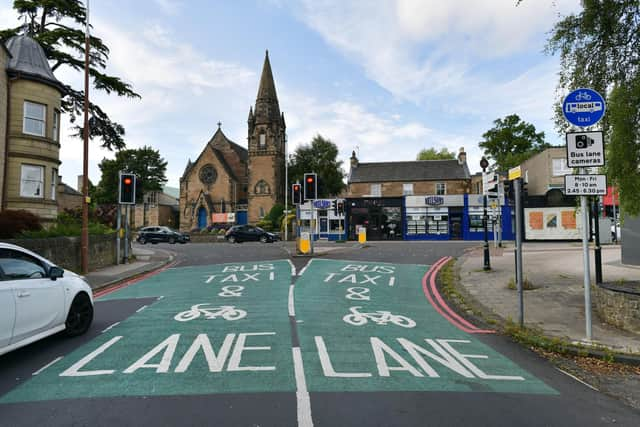Corstorphine Connections low traffic neighbourhood: Market research 'shows silent majority backs the scheme'
and live on Freeview channel 276
A “silent majority” of local residents back Corstorphine’s controversial Low Traffic Neighbourhood, Edinburgh transport convener Scott Arthur has claimed.
Market research for the council among people living in the area where the scheme has been implemented found supporters outnumbered opponents by two to one, though many of those asked said they didn’t know.
Advertisement
Hide AdAdvertisement
Hide AdThe scheme, known as Corstorphine Connections, includes traffic restrictions, a bus gate, wider pavements and more seating and planting. The aim is to stop drivers taking short cuts through residential streets and create a "safer and more comfortable environment" for those living in the area. But critics have said it just shifts traffic from one street to another and is failing to achieve its objectives. And the camera used to enforce the bus gate has been vandalised along with related signage.


Welcoming the research findings, Councillor Arthur said: “It’s fair to say people’s opinions about the scheme has been fairly mixed and the last time it was discussed at committee we had campaign groups strongly for and strongly against come along to the meeting.
"When I get emails from people about the project, I look at where the person lives relative to the scheme and often I find that people who have strong views about the scheme actually don’t live in the area and perhaps they feel inconvenienced because they can no longer drive through the area on their way to somewhere else.”
He said the market research had asked people who lived in the area what they thought of the scheme and attempted to get a representative cross-section of people in the Corstorphine Connectons neighbourhood.
Advertisement
Hide AdAdvertisement
Hide Ad"They have managed to tap into the silent majority and the figures show we have around 49 per cent supporting the scheme, with 24 per cent opposing it – so that’s two to one, with a lot of don’t knows, of course; 81 per cent of people supporting widening of the footpaths; 74 per cent supporting the narrowing of the roads; and there is a big increase in support particularly from parents who have young children in the area about how it’s now safer for their kids to walk to school."
He said he was surprised by the strength of support. “Some people complain about the footpaths being widened, but largely speaking, even people who are strongly against the scheme said actually in some places it was the right thing to do. It does seem a much quieter area to walk around now.
"We have seen previously with the open consultation on this scheme it was dominated by people who live outside the area – more than half the people were from outside the area. It doesn’t mean the views of people outside the area don’t matter, but the intended beneficiaries of this scheme are the people living in the area and particularly around the schools.”
The market research involved interviews with 302 residents and 313 shops and business users between October 16 and November 2, 2023. Results were compared with the “wave one” research which was conducted between March and July 2022.
Advertisement
Hide AdAdvertisement
Hide AdA report for the transport and environment committee says: “Almost half of residents supported the changes made for the Corstorphine Connections project, although the proportion strongly supporting it dropped from 19 per cent to 13 per cent.
“Almost all of the individual measures were described as good by the majority of residents surveyed, particularly planting and seating in new community spaces, wider footways and artistic works at schools. Changes to traffic movements tended to split opinions with 45 per cent considering them to be good and 31 per cent poor.”
The research found an increase in the number of people who thought traffic, pollution and noise were a problem in Corstorphine High Street and Saughton Road North.
When people were invited to make comments on the scheme, the most prevalent concern was that the project had not improved congestion or had moved the traffic problem to other streets. Some claimed the measures had actually caused more congestion in the area.
Advertisement
Hide AdAdvertisement
Hide AdBut the report concludes: “Overall, residents remain broadly positive about the Corstorphine Connections project and appreciate the majority of the measures that have been introduced. There does, however, remain a significant minority who oppose the introduction of the measures.
"There is yet to be a noticeable impact on behaviours in terms of methods of transport used in the area and frequency of using shops and businesses, but these behaviour changes are likely to take more time to become established. The third wave of research, expected to take place in 2024, will provide more evidence of whether the project has encouraged changes in the behaviours of residents and visitors.”